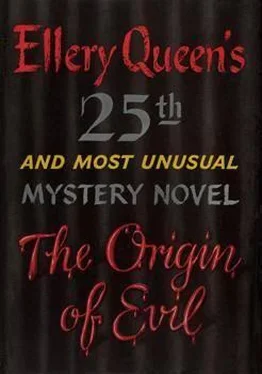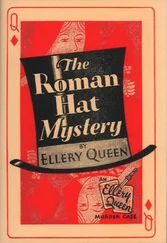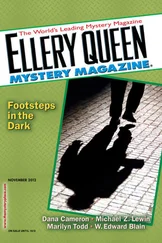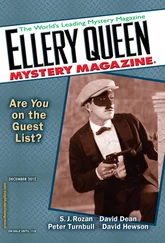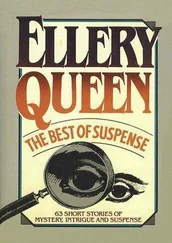She stopped behind a French lilac bush. The house was dark. No light anywhere. She moved along the strip of lawn below the terrace.
Even then it wouldn’t have been so nasty if it hadn’t concerned his mother . How could Mac have lived with Delia all these years and remained blind to what she was? Why did Delia have to be his mother?
Laurel tried the front door carefully. It was locked, sure enough. She unlocked it with the key, silently thankful that the Priams kept no dogs. She closed the door just as carefully behind her. Wielding the handkerchief-covered flashlight for a moment, she oriented herself; then she snapped it off.
She crept upstairs close to the banisters.
On the landing she used the flash again. It was almost three o’clock.
The four bedroom doors were closed. There was no sound either from this floor or the floor above, where the chauffeur slept. Mrs. Guittierez and Muggs occupied two servants’ rooms off the kitchen downstairs.
Laurel tiptoed across the hall and put her ear against a door. Then, quickly and noiselessly, she opened the door and went into Delia Priam’s bedroom. How co-operative of Delia to go up to Santa Barbara, where she was visiting “some old Montecito friends” for the weekend. The cloth-of-gold tree of life spread over the bed immaculately. In whose bed was she sleeping tonight?
Laurel hooked the flash to the belt of her coat and began to open dresser drawers. It was the weirdest thing, rummaging through Delia’s things in the dead of night by the light of a sort of dark lantern. It didn’t matter that you weren’t there to take anything. What chiefly made a sneak thief was the technique. If Delia’s father, or the unspeakable Alfred, were to surprise her now... Laurel held on to the thought of the leaden, blue-lipped face of Leander Hill.
It was not in the dresser. She went into Delia’s clothes closet.
The scent Delia used was strong, and it mingled disagreeably with the chemical odor of mothproofing and the cedar lining of the walls. Delia’s perfume had no name. It had been created exclusively for her by a British Colonial manufacturer, a business associate of Roger Priam’s, after a two-week visit to the Priam house years before. Each Christmas thereafter Delia received a quart bottle of it from Bermuda. It was made from the essence of the passionflower. Laurel had once suggested sweetly to Delia that she name it Prophetic, but Delia had seemed not to think that very funny.
It was not in the closet. Laurel came out and shut the door, inhaling.
Had she been wrong after all? Maybe it was an illusion, built on the substructure of her loathing for Delia and that single, startling look on Delia’s face as Ellery had held up the green wallet.
But suppose it wasn’t an illusion. Then the fact that it wasn’t where she would ordinarily have kept such a thing might be significant. Because Delia had hurried out of Roger’s den immediately. She might have gone directly upstairs to her bedroom, taken it from among the others, and stowed it away where it was unlikely to be found. By Muggs, for instance.
Where might Delia have hidden it? All Laurel wanted was to see it, to verify its existence...
It was not in the brassbound teak chest at the foot of the bed. Laurel took everything out and then put everything back.
After conquering three temptations to give it up and go home and crawl into bed and pull the bedclothes of oblivion over her head, Laurel found it. It was in the clothes closet after all. But not, Laurel felt, in an honest place. It was wedged in the dolman sleeve of one of Delia’s winter coats, a luxurious white duvetyn, which in turn was encased in a trans-parent plastic bag. Innocent and clever. Only a detective, Laurel thought, would have found it. Or another woman.
Laurel felt no triumph, just a shooting pain, like the entry of a hypodermic needle; and then a hardening of everything.
She had been right. She had seen Delia carrying one. Weeks before.
It was a woman’s envelope bag of forest green alligator leather, with gold initials. The maker’s name was Leatherland, Inc., of Hollywood, California.
A sort of Eve to the Adam of the wallet someone had sent to Roger Priam. A mate to the fourth warning.
“I suppose I should have told you yesterday,” Laurel said to Ellery in the cottage on the hill, “that Mac and I were down to Farmers’ Market on the trail of the green wallet. But we didn’t find out anything, and anyway I knew you’d know about it.”
“I’ve had a full report from Keats.” Ellery looked at Laurel quizzically. “We had no trouble identifying Tree Boy from the salesgirl’s description, and it stood to reason you’d put him up to it.”
“Well, there’s something else you don’t know.”
“The lifeblood of this business is information, Laurel. Is it very serious? You look depressed.”
“Me?” Laurel laughed. “It’s probably a result of confusion. I’ve found out something about somebody in this case that could mean...”
“Could mean what?” Ellery asked gravely, when she paused.
“That we’ve found the right one!” Laurel’s eyes glittered. “But I can’t quite put it into place. It seems to mean so much, only... Ellery, last night ― really in the early hours of this morning ― I did something dishonest and ― and horrible. Since Roger was poisoned Alfred Wallace has been locking the doors at night. I stole a key from Mac and in the middle of the night I let myself in, sneaked upstairs―”
“And you went into Delia Priam’s bedroom and searched it.”
“How did you know!”
“Because I caught the look on your face day before yesterday when you saw the look on Delia’s face. That man’s alligator wallet meant something to her. She either recognized it or something about it reminded her directly of something like it. And her start of recognition produced some sort of recognition in you, too, Laurel. Delia left the room at once, and before we went away we made sure of where she’d gone. She’d gone right up to her bedroom.
“She left for Santa Barbara yesterday afternoon, and last night ― while you were luring the key out of young Macgowan, probably ― I pulled a second-story job and gave the bedroom a going-over. Keats, of course, couldn’t risk it; the L.A. police have had to lean over backwards lately, and if Keats had been caught housebreaking there might have been a mess that would spoil everything. There wasn’t enough, of course, to justify a warrant and an open search.
“I left Delia’s alligator bag in the sleeve of the white coat, where I found it. And where, I take it, you found it a few hours later. I hope you left everything exactly as it was.”
“Yes,” moaned Laurel. “But all that breast-beating for nothing.”
Ellery lit a cigaret. “Now let me tell you something you don’t know, Laurel.” His eyes, which had not laughed at all, became as smoky as his cigaret. “That green alligator pocketbook of Delia’s was a gift. She didn’t buy it herself. Luckily, the salesgirl who sold it remembered clearly what the purchaser looked like, even though it was a cash sale. She gave an excellent and recognizable description, and when she was shown the corresponding photograph she identified it as the man she had described. The purchase was made in mid-April of this year, just before Delia’s birthday, and the purchaser was Alfred Wallace.”
“Alfred―” Laurel was about to go on, but then her teeth closed on her lower lip.
“It’s all right, Laurel,” said Ellery. “I know all about Delia and Alfred.”
“I wasn’t sure.” Laurel was silent. Then she looked up. “What do you think it means?”
“It could mean nothing at all,” Ellery said slowly. “Coincidence, for example, although coincidence and I haven’t been on speaking terms for years. More likely whoever it is we’re after may have noticed Delia’s bag and, consciously or unconsciously, it suggested to him the nature of the fourth warning to Priam. Delia’s suspicious actions can be plausibly explained, in this interpretation, as the fear of an innocent person facing a disagreeable involvement. Innocent people frequently act guiltier than guilty ones.
Читать дальше
